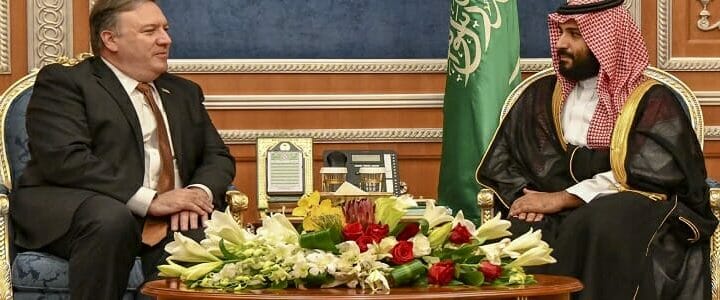It is irrefutable that the U.S. has vital national interests in the Arabian Peninsula. It is also more likely than not (if you subscribe to the Occam’s Razor theory that the simplest answer is likely the correct answer) that Saudi Arabia abducted and murdered Jamal Khashoggi, a Saudi journalist and U.S. resident who was a frequent and prominent critic of the royal family. That same theory also leads one to the conclusion that Crown Prince Mohammed bin Salman, who likes to be called MBS, is culpable.
And if that theory holds true, it is not something the U.S. can dismiss lightly. There must be a firm and serious response. But the more serious the response, the more likely the Saudi government is to retaliate. The question then is, “Can the U.S. protect those interests without a partnership with the Kingdom of Saudi Arabia?”
If not, then what is the maximum pressure the U.S. can apply against Saudi Arabia without destroying the relationship.
It’s not just the oil, but that’s a lot of it
Like it or not, the world is dependent on petroleum, and will continue to be for decades to come. Saudi Arabia has a lot of it.
Thanks to shale production, the U.S. has become the largest producer of oil, extracting a total of 3.4 billion barrels in 2017, and 2.22 billion barrels of crude oil between January and July of 2018. But we are only producing a little more than half of what we need.
So we import a lot of it… nearly 1.7 billion barrels between January and July of this year. 10% of that, more than any country except Canada, came from Saudi Arabia.
In fact, in that January to July period, the U.S. imported an average of a little more that 293,286 barrels of oil every day from Saudi Arabia. That represents 8% of its total oil production. But Saudi Arabia is capable of pumping much more than the 9,959,200 barrels per day that it pumps now. Or less, which is troubling, especially with new sanctions on Iran set to go into effect next month, which will remove 3.9 million barrels per day from the market (assuming everyone plays along).
Speaking of Iran…
Iran represents the greatest threat to peace and stability in the Middle East. It actively supports the government of Syrian strongman Bashar al-Assad, the Houthi rebels in Yemen, and terror groups Hamas in the Palestinian territories, Hezbollah in Lebanon. Saudi Arabia is our most influential regional ally in the fight against Iranian malign activities.
As the home to Mecca and Medina, the two holiest sites in Islam, the kingdom is Islam’s spiritual heart. The Saudi royal family wields tremendous influence over Muslims worldwide. That makes their assistance indispensable – despite charges that they play both sides against the middle.
Particularly in Yemen, Saudi Arabia is carrying the coalition’s water, fighting a proxy war against Iran so the U.S. doesn’t have to. But President Donald Trump has rightfully promised that Saudi Arabia would be “severely punished” if Turkey can prove the kingdom was behind Khashoggi’s disappearance
So how to punish responsible parties without destroying the relationship?
What’s everyone to do?
I think at a minimum, MBS will need to take legal action against the hit team, even though they were acting at his direction. According to photos Turkey has produced, some of the men who are alleged to have murdered Khashoggi are part of the prince’s personal security detail. That’s not a good look for the future king. And it certainly does nothing for his desire to be seen as a reformer.
So even though they’re his guys, MBS will have to prosecute some of them. The King could fall back on the “illegal orders” argument if necessary, or he could support the story that this was a “rogue operation.” However it happens, MBS will need to have his wings clipped. He’ll have to cede some of his day-to-day control of the government. He’ll also probably have to pay Khashoggi’s family a lot of money, and have his personal business ventures in the U.S. severely curtailed.
The Treasury Department is going to have to restrict MBS’s ability to operate in the U.S., at least for a few years. Other members of the royal family will probably face a similar punishment. But all this has to happen amid a delicate diplomatic dance so as not to be seen as punishing every Saudi prince for MBS’s transgressions.
The stakes are too high, and Saudi Arabia is too powerful, to answer this apparent human rights violation with the financial equivalent of a sledgehammer.




